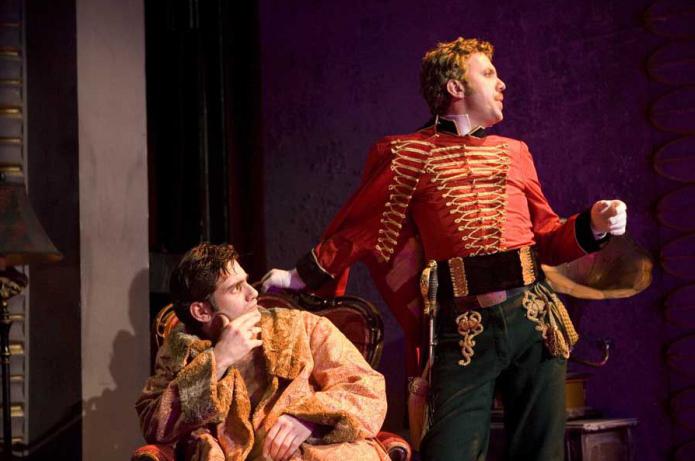The work of Alexander Nikolayevich Ostrovsky is deservedly the pinnacle of Russian drama in the mid-19th century. It is familiar to us since school years. And despite the fact that the plays of Ostrovsky, the list of which is very long, were written as far back as the century before last, they remain relevant even now. So what is the merit of the famous playwright and how was the innovation of his work manifested?
short biography
Alexander Ostrovsky was born on March 31 (April 12) in 1823 in Moscow on Malaya Ordynka. The childhood of the future playwright passed in Zamoskvorechye - the merchant district of Moscow. The playwright's father, Nikolai Fedorovich, served as a lawyer and wanted his son to follow in his footsteps. Therefore, Ostrovsky studied for several years as a lawyer and after that, by the will of his father, he entered the court as a scribe. But already then Ostrovsky began to create his first plays. Since 1853, the playwright's works are staged in St. Petersburg and Moscow. Alexander Ostrovsky had two wives and six children.
General characteristics of creativity and themes of Ostrovsky's plays
Over the years of his work, the playwright created 47 plays. “Poor bride”, “Forest”, “Dowry”, “Snow Maiden”, “Poverty is not a vice” - all these are Ostrovsky’s plays. The list goes on for a very long time. Most of the plays are comedies. No wonder Ostrovsky remained in history as a great comedian - even in his dramas there is a funny beginning.
The great merit of Ostrovsky lies in the fact that it was he who laid down the principles of realism in Russian drama. His work reflects the very life of the people in all their diversity and naturalness, the heroes of Ostrovsky's plays are very different people: merchants, artisans, teachers, officials. Perhaps the works of Alexander Nikolaevich to this day are close to us precisely because his characters are so realistic, truthful and so similar to ourselves. Let us analyze this with specific examples of several plays.
The early work of Nikolai Ostrovsky. "Our people - let's count"
One of the debut plays that gave Ostrovsky a universal celebrity was the comedy "Our People - Let's Count." Its plot is built on the basis of events that really took place from the legal practice of the playwright.
The play depicts the deception of the merchant Bolshov, who declared himself bankrupt so that he would not have to pay his debts, and the response scam of his daughter and son-in-law who refused to help him. Here Ostrovsky depicts the patriarchal traditions of life, the characters and vices of Moscow merchants. In this play, the playwright sharply touched on the theme that red lines passed through all his work: this is the theme of the gradual destruction of the patriarchal way of life, the transformation of moral values and human relations themselves.
Analysis of Ostrovsky's play The Storm
The play "The Storm" was a turning point and one of the best works in Ostrovsky's works. It also shows the contrast between the old patriarchal world and a fundamentally new way. The play takes place on the banks of the Volga in the provincial town of Kalinov.
The main character Katerina Kabanova lives in the house of her husband and his mother, the tradeswoman Kabanikh. She suffers from constant pressure and oppression from her mother-in-law - a bright representative of the patriarchal world. Katerina is torn between a sense of duty towards her family and a flood of feelings for another. She is confused because she loves her husband in her own way, but she cannot control herself and agrees to meet with Boris. After the heroine repents, her desire for freedom and happiness is confronted with established moral principles. Katerina, incapable of deception, confesses to her husband and Kabanikh.

She can no longer live in a society where lies and tyranny reigns and people are not able to perceive the beauty of the world. The heroine’s husband loves Katerina, but cannot, like her, rebel against her mother’s oppression - for this he is too weak. Beloved, Boris, is also not able to change anything, since he himself cannot be freed from the power of the patriarchal world. And Katerina commits suicide - a protest against the old order, doomed to destruction.
As for this play by Ostrovsky, the list of heroes can be divided into two parts. In the first there will be representatives of the old world: Kabanikha, Wild, Tikhon. In the second, there are heroes symbolizing a new beginning: Katerina, Boris.
Heroes of Ostrovsky
Alexander Ostrovsky created a gallery of a wide variety of characters. Here, officials and merchants, peasants and nobles, teachers and artists are as diverse as life itself. A remarkable feature of Ostrovsky’s dramaturgy is the speech of his characters - each character speaks his own language, corresponding to his profession and character. It is worth noting the skillful use by the playwright of folk art: proverbs, sayings, songs. As an example, one can even cite at least the name of Ostrovsky's plays: “Poverty is not a vice,” “We will reckon with our own people,” and others.
The significance of Ostrovsky's dramaturgy for Russian literature
The dramaturgy of Alexander Ostrovsky served as a significant stage in the formation of the national Russian theater: it was he who created it in its present form, and this is the undoubted innovation of his work. Ostrovsky’s plays, the list of which was briefly given at the beginning of the article, confirmed the triumph of realism in Russian drama, and he went down in its history as a unique, distinctive and vivid master of the word.